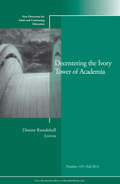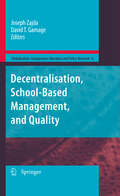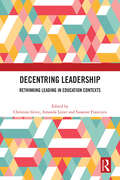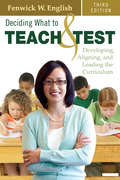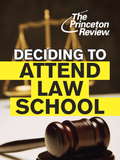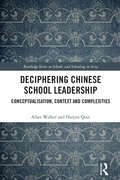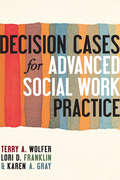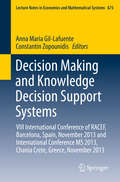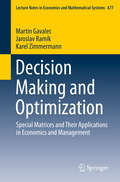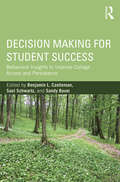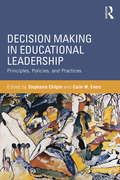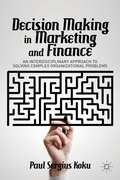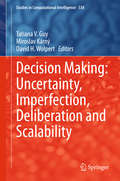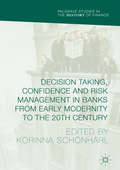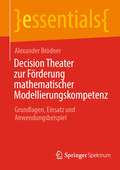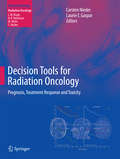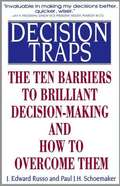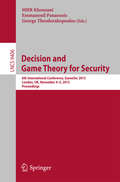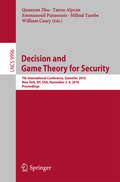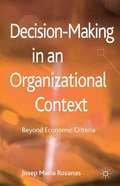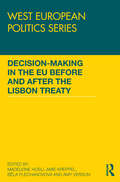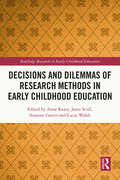- Table View
- List View
Decentering the Ivory Tower of Academia: New Directions for Adult and Continuing Education, Number 139 (J-B ACE Single Issue Adult & Continuing Education)
by Dianne RamdehollFor many, the academy has historically represented privilege and intellectual exclusion; for others it has represented an increasingly contested site, as marginalized populations have challenged the myth of the ivory tower being a haven of meritocracy and equal opportunities. Still others persist in viewing universities as a level playing field, a place where people are judged primarily by their ideas and intellectual contributions. Ironically, alongside these charged conversations of exclusivity, privilege, and opportunity has occurred the seduction of the ivory tower by market interests, sacrificing standards in the interests of ill-defined efficiency. Much has been written on the increasingly market-driven culture of higher education; many have called this commodification and instrumentalization the most dangerous ideology of the current historical moment. Yet, within this landscape, there have been scholars willing to make space to critically interrogate higher education in relation to multiple systems of oppression. They are working to introduce new perspectives, nurturing counter-hegemonic knowledges. Many have struggled to cocreate and sustain democratic spheres that decenter dominant interests, with the aim of a more equitable society. They have been part of a larger movement of academic warriors, academics with consciences who live out their commitments by subscribing to the notion that scholarship and activism are inextricably intertwined. This volume embodies their narratives and issues an open invitation. This is 139th volume of this Jossey-Bass quarterly report series. Noted for its depth of coverage, it explores issues of common interest to instructors, administrators, counselors, and policymakers in a broad range of adult and continuing education settings, such as colleges and universities, extension programs, businesses, libraries, and museums.
Decentralisation, School-Based Management, and Quality
by Joseph Zajda David T. GamageThe relationship between government, education reform and student outcomes is an ambivalent and often problematic one. Focusing on the interplay between decentralization, globalization, and education reforms, this book draws on recent studies to explore the conceptual frameworks and methodological approaches that can be applied to research covering the state, globalization, equality, and education. It lays bare the neo-liberal ideological imperatives of education and policy reforms, and illustrates the way the relationship between the state and education policy affects current models and trends in education reforms and schooling globally. The chapters critically analyze the dominant discourses about decentralization and comparative education and examine the current resurgence of neo-liberal ideological models in education, both newly constructed and re-invented. To ensure as broad a perspective on the issues as possible, the authors employ a raft of diverse paradigms in comparative education research, ranging from critical theory to globalization. This in-depth exploration of globalization, ideology and democracy in education examines both the reasons for and outcomes of education reforms, decentralization, policy change and transformation. In doing so, it seeks to provide a more informed critique on Western-driven models of accountability, quality and school effectiveness. It is the eighth in the 12-volume book series Globalization, Comparative Education and Policy Research, which presents scholarly research on major discourses in comparative education research with reference to decentralization and school-based management. The series provides an accessible, practical yet scholarly source of information about international issues in the field of globalization and comparative education.
Decentring Leadership: Rethinking Leading in Education Contexts
by Susanne Francisco Christine Grice Amanda LizierThis book is about the practices of leading and their arrangements in a range of contemporary educational contexts. It seeks to shift the traditional, individual, and role-based educational leadership narrative, to more transformational, shared, and ongoing practices between people, thereby decentring leadership. In this volume, contributors consider leading from a practice perspective across a range of educational contexts. Focusing on leading, rather than leadership, they examine how educational leaders lead through decentring from a range of positions and across a range of educational sectors from schools to higher education. Chapters attend to the practices of leading to ‘decentre’ normative, traditional notions of leadership that focus on the individual leader as the unit of study. They draw on the theory of practice architectures to understand leading as a shared and ongoing process rather than as an individual act. This growing body of work that uses the theory of practice architectures (TPA) is disrupting people’s thinking towards leading as a practice. Focusing on practices and their arrangements shifts the traditional, role-based educational leadership narrative to the more transformational elements of practice architectures in thinking about leading in contemporary contexts. Decentring Leadership will be a key resource for practitioners and researchers of education leadership and policy, educational administration, educational research, educational studies and sociology. It was originally published as a special issue of the Journal of Educational Administration and History.
Deceptions: 21 Fascinating Stories of Trickery and Fraud (Critical Reading Series)
by Henry Billings Melissa BillingsThis best-selling series motivates students with high-interest selections at a higher readability level. Critical Reading, a perennial favorite for middle school and high school students of all ability levels, fascinates with astounding and intriguing stories of real-life adventure. Comprehension questions reinforce literal understanding, while critical thinking questions encourage students to consider the author's purpose, make inferences, identify cause and effect, and make predictions. The entire series is designed to reinforce state reading standards. The selections in the Critical Reading series are at the highest level of readability in our triple-threat offering which also includes The Real Deal and The Wild Side. Reading Level 6-8. Interest Level 6-12
Deciding What to Teach and Test: Developing, Aligning, and Leading the Curriculum (3rd Edition) (Successful Schools)
by Fenwick W. EnglishFocusing on curriculum leadership and closing the achievement gap, this influential book is updated with new insights on developing and aligning curriculum in a standards-based environment.
Deciding to Attend Law School
by Princeton ReviewThinking of going to law school? This concise but comprehensive ebook gives you the information you need to decide if a JD and a career as a lawyer are right for you. In Deciding to Attend Law School, Eric Owens and the experts at the Princeton Review lay out key information to give you a thorough understanding of the issues you may need to consider before applying to law school. You'll get essential info on: · the current admissions landscape · the academic experience · paying for law school · what the market for legal jobs is like right now · factors to consider when choosing a law school · what you can expect after graduation Will you enjoy law school socially? Will you be happy practicing law? What kind of law career might be the most rewarding for you? Will you be able to pay off your loans? Deciding to Attend Law School will give you the information you need to answer those questions--the background, the statistics, and the context to help you make the most informed choice possible. As a bonus, we've also included 3 lists from our popular The Best 167 Law Schools profile guide, showing Admissions Selectivity, Academic Experience, and Career Prospects ratings for all 167 schools.
Deciphering Chinese School Leadership: Conceptualisation, Context and Complexities (Routledge Series on Schools and Schooling in Asia)
by Allan Walker Haiyan QianWith existing educational leadership models and theories being predominantly western influenced, this book aims to provide more insight into school leadership in China. It pioneers building research- and practice-informed knowledge and unravels the complexities that characterize the scholarship, context and practices of school leadership. School leadership in China is presented through four sub-purposes: investigating how Chinese school leadership is conceptualized in the international and Chinese literature; exploring the shifting context within which Chinese school leaders enact their leadership, and examining key policies that have shaped the practice of leader development; extending the understandings about the complexities of work lives of Chinese school leaders; and further locating indigenous understandings of Chinese school leadership in the political and socio-cultural context of contemporary China, and the theoretical and conceptual context of international school leadership. This text will be particularly useful to international education researchers with focus on educational leadership, comparative education, education policy and education in China.
Decision Cases for Advanced Social Work Practice
by Terry A. Wolfer Lori D Franklin Karen A GrayThese fifteen cases take place in child welfare, mental health, hospital, hospice, domestic violence, refugee resettlement, veterans' administration, and school settings and reflect individual, family, group, and supervised social work practice. They confront common ethical and treatment issues and raise issues regarding practice interventions, programs, policies, and laws. Cases represent open-ended situations, encouraging students to apply knowledge from across the social work curriculum to develop problem-solving and critical-thinking skills. An instructor's manual is available on the press's website.
Decision Making and Knowledge Decision Support Systems
by Constantin Zopounidis Anna Maria Gil-LafuenteThis book presents recent advancements of research, new methods and techniques, applications and projects in decision making and decision support systems. It explores expert systems and neural networks, knowledge engineering and management, fuzzy sets and systems and computational methods for optimization, data analysis and decision making. It presents applications in Economics, Finance, Management and Engineering. The book undertakes to stimulate scientific exchange, ideas and experiences in the field of decision making in Economy and Management. Researchers and practitioners alike will benefit from this book, when they are dealing with imprecision, vagueness and uncertainty in the context of decision making.
Decision Making and Optimization
by Martin Gavalec Jaroslav Ramík Karel ZimmermannThe book is a benefit for graduate and postgraduate students in the areas of operations research, decision theory, optimization theory, linear algebra, interval analysis and fuzzy sets. The book will also be useful for the researchers in the respective areas. The first part of the book deals with decision making problems and procedures that have been established to combine opinions about alternatives related to different points of view. Procedures based on pairwise comparisons are thoroughly investigated. In the second part we investigate optimization problems where objective functions and constraints are characterized by extremal operators such as maximum, minimum or various triangular norms (t-norms). Matrices in max-min algebra are useful in applications such as automata theory, design of switching circuits, logic of binary relations, medical diagnosis, Markov chains, social choice, models of organizations, information systems, political systems and clustering. The input data in real problems are usually not exact and can be characterized by interval values.
Decision Making for Student Success: Behavioral Insights to Improve College Access and Persistence
by Saul Schwartz Sandy Baum Benjamin L. CastlemanEach year, many students with affordable college options and the academic skills needed to succeed do not enroll at all, enroll at institutions where they are not well-positioned for success, or drop out of college before earning a credential. Efforts to address these challenges have included changes in financial aid policy, increased availability of information, and enhanced academic support. This volume argues that the efficacy of these strategies can be improved by taking account of contemporary research on how students make choices. In Decision Making for Student Success, scholars from the fields of behavioral economics, education, and public policy explore contemporary research on decision-making and highlight behavioral insights that can improve postsecondary access and success. This exciting volume will provide scholars, researchers, and higher education administrators with valuable perspectives and low-cost strategies that they can employ to improve outcomes for underserved populations.
Decision Making in Educational Leadership: Principles, Policies, and Practices (Educational Leadership And Policy Decision-making In Neoliberal Times Ser.)
by Colin W. Evers Stephanie ChitpinThe increased focus on raising standards in education requires leaders to engage in complex decision making about teacher assessment, mandated accountability measures, and the collection and use of large amounts of data. Showcasing exemplary practices of school and district administrators, Decision Making in Educational Leadership covers issues concerning the role of emotion, ethical and legal ramifications, the use of data, and complexity in decision making. Chapter authors in this research-based volume explore what administrators and school leaders actually know about educational problems, how they draw upon and revise theories of action for responding to problems, and which theories are tenable in educational decision making. This important resource provides a broad and international perspective on effective models and methods of educational decision making and shares valuable knowledge about how theory can be translated into practice in a variety of school settings.
Decision Making in Health and Medicine
by Joseph S. Pliskin M.G. Myriam Hunink Milton C. Weinstein Eve Wittenberg Michael F. Drummond Joseph S. Pliskin John B. Wong Paul P. Glasziou M.G. Myriam Hunink Milton C. Weinstein Eve Wittenberg Michael F. Drummond John B. WongDecision making in health care means navigating through a complex and tangled web of diagnostic and therapeutic uncertainties, patient preferences and values, and costs. In addition, medical therapies may include side effects, surgery may lead to undesirable complications, and diagnostic technologies may produce inconclusive results. In many clinical and health policy decisions it is necessary to counterbalance benefits and risks, and to trade off competing objectives such as maximizing life expectancy vs optimizing quality of life vs minimizing the required resources. This textbook plots a clear course through these complex and conflicting variables. It clearly explains and illustrates tools for integrating quantitative evidence-based data and subjective outcome values in making clinical and health policy decisions. An accompanying CD-ROM features solutions to the exercises, PowerPoint® presentations of the illustrations, and sample models and tables.
Decision Making in Marketing and Finance
by Paul Sergius KokuAs interest in MBA programs and business schools more generally continues to grow, it is essential that teachers and students analyse their established strategy for decision making. The successful use of case studies in business schools shows the superior outcomes of an interdisciplinary approach to problem solving. Disappointingly, functional departmental silos within universities still exist and keep problem solvers from seeing all the effects of a given issue. In addition to providing teaching material, Decision Making in Marketing and Finance provides motives and strategies to break down functional silos in making informed and effective business and finance decisions. Koku achieves his goal by showing how value can be created for shareholders and other stakeholders, linking marketing and finance decision making, and providing much-needed teaching materials for an interdisciplinary approach to case analysis.
Decision Making: Uncertainty, Imperfection, Deliberation and Scalability
by Tatiana V. Guy Miroslav Kárný David H. WolpertThis volume focuses on uncovering the fundamental forces underlying dynamic decision making among multiple interacting, imperfect and selsh decision makers. The chapters are written by leading experts from different disciplines, all considering the many sources of imperfection in decision making, and always with an eye to decreasing the myriad discrepancies between theory and real world human decision making. Topics addressed include uncertainty, deliberation cost and the complexity arising from the inherent large computational scale of decision making in these systems. In particular, analyses and experiments are presented which concern: * task allocation to maximize "the wisdom of the crowd"; * design of a society of "edutainment" robots who account for one anothers' emotional states; * recognizing and counteracting seemingly non-rational human decision making; * coping with extreme scale when learning causality in networks; * efciently incorporating expert knowledge in personalized medicine; * the effects of personality on risky decision making. The volume is a valuable source for researchers, graduate students and practitioners in machine learning, stochastic control, robotics, and economics, among other elds.
Decision Taking, Confidence and Risk Management in Banks from Early Modernity to the 20th Century
by Korinna SchönhärlThis book offers 14 contributions that examine key questions concerning bankers#65533; decision making, their confidence in partners and customers, and their risk management practices from Early Modernity to the 20th century. It explores various mechanisms of banks' decision taking, how they were established and how they changed over time. Specific chapters also analyze the types of risk management techniques used and the extent of their success; factors that contributed to the constitution of confidence and factors that damaged it; and methods that banking historians can use to analyze and describe bankers#65533; risk management and decision making. The volume features varied methodological approaches for historical research (from system theory to behavioural finance, from new institutional economics to praxeology, from convention theory to network analysis). The different methodological approaches are put to the test in case studies based on archive material from five hundred years of banking (from Early Modern European banking networks to international computerization) in order to connect banking history more closely to political and cultural history.
Decision Theater zur Förderung mathematischer Modellierungskompetenz: Grundlagen, Einsatz und Anwendungsbeispiel (essentials)
by Alexander BrödnerDieses Buch bietet eine grundlegende Einführung in den Einsatz der Methode des Decision Theater zur Vermittlung von mathematischer Modellierungskompetenz im Schulkontext. In den letzten Jahren hat sich unter anderem anhand der Covid-19 Pandemie mehr denn je gezeigt, wie Mathematik im Allgemeinen und das mathematische Modellieren im Speziellen zum Verständnis globaler Herausforderungen und Möglichkeiten zu ihrer Bewältigung beiträgt. Deshalb sollte die mathematische Modellierungskompetenz eine zentrale Rolle im Schulunterricht spielen. Doch der Prozess von Vermittlung und Erwerb einer solchen Kompetenz ist komplex und mit vielfältigen Schwierigkeiten verbunden. Angesichts dieser Ausgangslage stellt das Buch die Methode des Decision Theater als innovative Lernumgebung neuer Art vor, die die Vermittlung von mathematischer Modellierungskompetenz unterstützen kann. Dabei trägt die Methode des Decision Theatre auf drei Ebenen dazu beiträgt, Modellierungskompetenz und ein damit verbundenes ganzheitliches Bild der Mathematik zu fördern: Das Decision Theatre dient als IT-Dienstleister, als Wissenschaftskommunikator und als interaktiv-diskursive Lernumgebung. Neben Geschichte und Definition des Decision Theater, stellt das Buch dessen Einsatz konkret am Beispiel des Projekts „Schule @ Decision Theatre Lab“ des Berliner Exzellenzclusters MATH+ Berlin Mathematics Research Center vor. Als Zusammenfassung der wichtigsten Aspekte des Einsatzes der Methode des Decision Theater im Schulkontext richtet sich das Buch an Didaktiker*innen und Lehrkräfte aller Schulformen.
Decision Tools for Radiation Oncology
by Carsten Nieder Laurie E. GasparA look at the recent oncology literature or a search of the common databases reveals a steadily increasing number of nomograms and other prognostic models. These models may predict the risk of relapse, lymphatic spread of a given malignancy, toxicity, survival, etc. Pathology information, gene signatures, and clinical data may all be used to compute the models. This trend reflects increasingly individualized treatment concepts, the need for approaches that achieve a favorable balance between effectiveness and side-effects, and the goal of optimal resource utilization reflecting prognostic knowledge. In order to avoid misuse, it is important to understand the limits and caveats of prognostic and predictive models. This book provides a comprehensive overview of such decision tools for radiation oncology, stratified by disease site, which will enable readers to make informed choices in daily clinical practice and to critically follow the future development of new tools in the field.
Decision Traps: Ten Barriers to Brilliant Decision-Making and How to Overcome Them
by J. Edward Russo Paul H. SchoemakerFrom the Book Jacket: Make Every Decision Your Best Decision Executives rate decision-making ability as the most important business skill, but few people have the training they need to make good decisions consistently. Becoming a good decision-maker is like training to be a top athlete: Just as the best coaches use training methods to help athletes develop proper techniques and avoid mistakes, Dr. J. Edward Russo and Dr. Paul I. H. Schoemaker have developed a program that can help you avoid "decision traps"-the ten common decision-making errors that most people make over and over again. Dr. Russo and Dr. Schoemaker have improved the decision- making skills of thousands of Fortune 500 executives with this program. Now you can use their decision-making techniques to make sure that your last bad decision was your last bad decision.
Decision and Game Theory for Security
by Mhr Khouzani Emmanouil Panaousis George TheodorakopoulosThis book constitutes the refereed proceedings of the 6th International Conference on Decision and Game Theory for Security, GameSec 2015, held in London, UK, in November 2015. The 16 revised full papers presented together with 5 short papers were carefully reviewed and selected from 37 submissions. Game and decision theory has emerged as a valuable systematic framework with powerful analytical tools in dealing with the intricacies involved in making sound and sensible security decisions. For instance, game theory provides methodical approaches to account for interdependencies of security decisions, the role of hidden and asymmetric information, the perception of risks and costs in human behaviour, the incentives/limitations of the attackers, and much more. Combined with our classical approach to computer and network security, and drawing from various fields such as economic, social and behavioural sciences, game and decision theory is playing a fundamental role in the development of the pillars of the "science of security".
Decision and Game Theory for Security
by Tansu Alpcan Emmanouil Panaousis Quanyan Zhu Milind Tambe William CaseyThis book constitutes the refereed proceedings of the 6th International Conference on Decision and Game Theory for Security, GameSec 2015, held in London, UK, in November 2015. The 16 revised full papers presented together with 5 short papers were carefully reviewed and selected from 37 submissions. Game and decision theory has emerged as a valuable systematic framework with powerful analytical tools in dealing with the intricacies involved in making sound and sensible security decisions. For instance, game theory provides methodical approaches to account for interdependencies of security decisions, the role of hidden and asymmetric information, the perception of risks and costs in human behaviour, the incentives/limitations of the attackers, and much more. Combined with our classical approach to computer and network security, and drawing from various fields such as economic, social and behavioural sciences, game and decision theory is playing a fundamental role in the development of the pillars of the "science of security".
Decision-Making in an Organizational Context
by Josep Maria RosanasIllustrates how decision-making in organizations has to go beyond economic criteria and the individual level, due to the impossibility of making decisions that do not affect other human beings. The author reviews the conventional analyses of decision-making that do not take into account how decisions affect others and suggests an alternate model.
Decision-Making in the EU before and after the Lisbon Treaty (West European Politics Ser.)
by Amy Verdun Madeleine Hosli Amie KreppelDecision-making in the European Union before and after the Lisbon Treaty aims to assess what the changes the Treaty of Lisbon envisaged and whether these ambitions have materialised since the Treaty entered into force. It offers analyses of the past, as well as what might be the future (because some provisions will only enter into effect in the years to come). To what extent has the current decision-making process been able to address the shortcomings and challenges of the past? What has been the impact of aspects of the Lisbon Treaty that clarified pre-existing norms and structures, in some cases formalizing them, rather than introducing new changes? The authors in this book look at the interaction between formal rules and informal practices seeking to point to the interaction between the two. They find that informal practices to date typically still dominate formal rules. This book was published as a special issue of West European Politics.
Decisions (Sweet Valley High #46)
by Francine Pascal Kate WilliamGeorge's face was grim as he drove along with Robin. "Your aunt has no right to mess up our plans, Robin. You're staying right here. She can't send you three thousand miles away like you're her property." A chill traveled up Robin's spine. George was doing the same thing her aunt was doing-- deciding what was right for her without asking her what she thought!
Decisions and Dilemmas of Research Methods in Early Childhood Education (Routledge Research in Early Childhood Education)
by Anne KearyThis book examines the methodological decisions made by researchers working in early childhood contexts. Viewed from a researcher’s perspective, each chapter explores the journey of the researcher, capturing their decision-making processes in early childhood research. Through themes such as the politics of ethics and how different cultural norms shape research in different localities, Decisions and Dilemmas of Research Methods in Early Childhood Education explores key questions such as: What are the ethical issues arising during early childhood research? Which research traditions and methodologies prevail and why? How are research subjects perceived and positioned within different research contexts? What interdisciplinary tensions or opportunities arise between different ways of working across early childhood research? The book critically unpacks how these decisions are made and by whom during the course of research. Each chapter includes reflections of researchers working across disciplines such as education, health and social work to understand the thinking, forces and actors that shape decisions made during the research process. This is essential reading for researchers working in early childhood contexts in fields such as social work, health, education, criminology, psychology and more.
